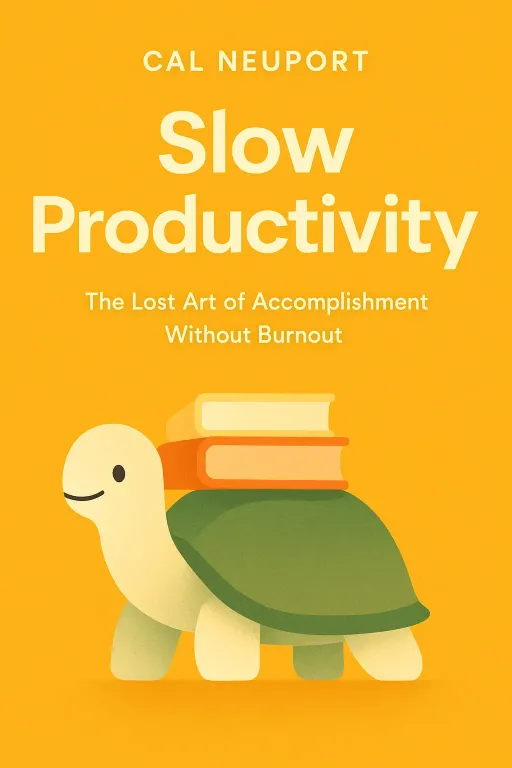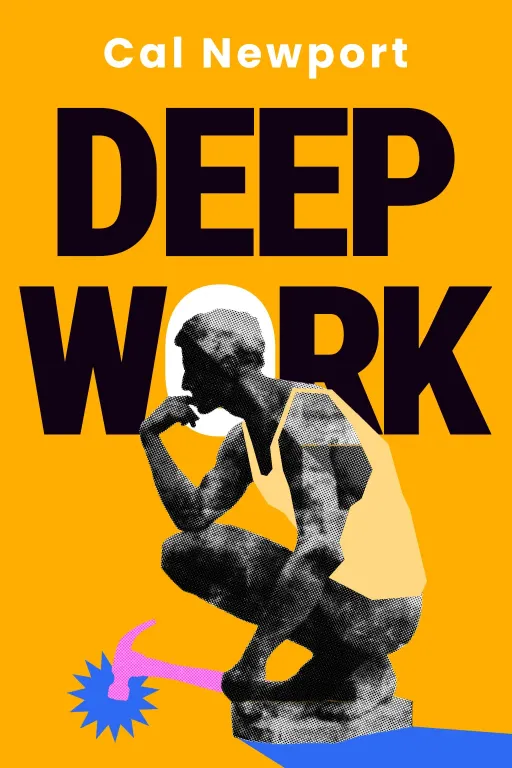
The Genius of Slowness
11 minThe Lost Art of Accomplishment Without Burnout
Golden Hook & Introduction
SECTION
Mark: What if your to-do list is a trap, your overflowing inbox is a sign of failure, and the busiest person in your office is probably the least productive? Today, we’re exploring a philosophy that says the secret to real accomplishment is to work less, move slower, and ignore most things. Michelle: Honestly, that sounds less like a philosophy and more like my secret fantasy for every Monday morning. You’re telling me there’s a legitimate argument for this? I’m all ears. Mark: There is, and it’s a powerful one. We're diving into Slow Productivity: The Lost Art of Accomplishment Without Burnout by Cal Newport. Michelle: Right, and Newport is such an interesting figure to be writing this. He's not some lifestyle guru who lives on a beach; he's a full professor of computer science at Georgetown University. He’s coming at this from a world of intense, high-level knowledge work. Mark: Exactly. He’s lived in the belly of the beast of academic pressure, and this book is his diagnosis of a sickness he sees everywhere. A sickness he calls "pseudo-productivity."
The Tyranny of the To-Do List: Deconstructing 'Pseudo-Productivity'
SECTION
Michelle: Okay, "pseudo-productivity." I have a feeling I know what this is, but break it down for me. What does he mean? Mark: He means we've started confusing visible activity with valuable effort. In the absence of clear ways to measure what knowledge workers actually produce, we’ve defaulted to a simple, but terrible, proxy: are you looking busy? Michelle: Oh, I know this. It’s the person who sends emails at 10 PM just to show they’re working. It’s the back-to-back meetings on the calendar that look impressive but accomplish nothing. Mark: Precisely. Newport tells this incredible story from 1995. Leslie Moonves, the new head of entertainment at CBS, walked through the offices at 3:30 on a Friday and found them mostly empty. He was furious. He sent out this heated memo saying, "My guess is that at ABC and NBC they’re still working... This will no longer be tolerated." Michelle: Wow. That's such a classic manager-brain move. Equating physical presence with creating the next hit TV show. The assumption is that great ideas are punched in on a time clock. Mark: And that’s the core of pseudo-productivity. It creates this culture of performative work. But Newport adds another layer to it that’s even more insidious. He calls it the "overhead tax." Michelle: An overhead tax? What’s that? Mark: Every new commitment, every project, every email chain you're added to, comes with its own administrative work. Scheduling, coordinating, replying, following up. This is the tax. As your workload increases, this tax gets higher and higher until you reach a tipping point. Michelle: I think I hit that tipping point around 2021. Mark: We all did! He calls it the "Zoom Apocalypse." The pandemic pushed this overhead tax into overdrive. Suddenly, a simple five-minute question became a 30-minute scheduled Zoom call. The tax became so high that people were spending their entire day just managing the logistics of their work, with no time left for the actual work itself. Michelle: That is it exactly. It’s like being a hamster on a wheel. You're running furiously, you're sweating, you feel exhausted and "productive" at the end of the day, but the cage hasn't moved an inch. You've just paid your overhead tax. Mark: And you’re left with this gnawing feeling of dissatisfaction. You were busy all day, but what did you actually create? What did you accomplish? For most people, the answer is "I cleared my inbox." Michelle: That’s a bleak picture of modern work. So if we're all just performing busyness and drowning in this self-imposed tax, what's the way out? What's the alternative?
The Genius of Slowness: Doing Fewer Things at a Natural Pace
SECTION
Mark: The alternative is the heart of the book. It’s built on three principles, and the first two are a direct rebellion against that frantic energy. Principle one: Do Fewer Things. Principle two: Work at a Natural Pace. Michelle: Okay, "Do Fewer Things." That sounds lovely, but also completely unrealistic for most people. My boss isn't going to be happy if I just decide to do half my job. Mark: It's less about doing half your job and more about radically reducing the number of projects you're juggling at any one time. Newport argues that our brains are not built for the constant context-switching that modern work demands. And he uses some amazing historical examples to prove his point. Take Jane Austen. Michelle: I'm listening. I picture her as this whirlwind of creative genius, writing masterpieces in stolen moments. Mark: That’s the myth. The myth is that she wrote in secret, squeezing it in between social calls and household chores. Newport digs into her history and finds the opposite is true. Her most prolific, most brilliant period of writing happened when she moved to a cottage in Chawton. Her family made a deliberate, unspoken agreement to free her from most obligations. She had space. She had focus. She did fewer things. Michelle: That’s a total reframe. Her genius wasn't a product of multitasking; it was a product of single-tasking on a life-sized scale. They created a bubble of focus for her. Mark: Exactly. And that flows right into the second principle: working at a natural pace. We have this idea that great minds work in a constant, high-intensity frenzy. But Newport shows that’s just not true. He points to the great scientists of the Enlightenment. Isaac Newton didn't just sit under an apple tree, have a flash of insight, and write down the laws of gravity in an afternoon. Michelle: I’m guessing it took a bit longer than that. Mark: Decades. The ideas unfolded over decades. There were intense bursts of work, followed by long periods of letting the ideas simmer, doing other things, and living life. He compares this to the work rhythms of ancient hunter-gatherers—not a constant, monotonous grind like agriculture, but varied cycles of intense effort followed by rest and recovery. Michelle: That makes so much sense. Our bodies and brains are built for seasons, for sprints and rests, not for a year-long, 52-week marathon at the same grueling pace. Mark: And that’s the point. The 9-to-5, always-on, hyper-responsive workday is a very recent, and very unnatural, invention. Michelle: Okay, but this is where the book gets some pushback, and I think it's a fair critique. It’s easy to talk about working at a 'natural pace' if you're a tenured professor like Cal Newport, or a 19th-century novelist with family support, or Isaac Newton. What about a single parent working two jobs? Or an entry-level employee who gets fired if they don't answer emails within ten minutes? This philosophy can feel a bit... privileged. Mark: That is the perfect question, and it’s the most important one. Because it leads directly to the third principle, which is the engine that makes the whole philosophy work for everyone, not just the privileged few. It's the part that gives you the power to earn the right to work this way.
Quality as a Lever: How Obsession Creates Freedom
SECTION
Michelle: I’m intrigued. What’s the magic third principle? Mark: Obsess. Over. Quality. This, Newport argues, is the glue that holds everything together. It’s what transforms "slowness" from a lazy indulgence into a powerful career strategy. Michelle: How so? I get that doing good work is, well, good. But how does it get you off the hamster wheel of busyness? Mark: Because quality creates leverage. When you become known for producing exceptional work, you gain a currency that’s more valuable than speed or responsiveness. That currency is trust and reputation. And you can trade that currency for autonomy. Michelle: You can use it to buy your freedom from the very system that’s burning you out. Mark: Precisely. And he tells the most incredible story to illustrate this. The musician Jewel. In the mid-90s, she was a phenomenon. She had been living out of her car, homeless, and suddenly record labels are in a bidding war over her. She gets offered a million-dollar signing bonus. Michelle: A life-changing amount of money for someone in her position. Mark: And she turned it down. Michelle: She did what? Why on earth would she do that? Mark: Because she knew her art wasn't good enough yet. She knew that if she took the money, the label would own her. They’d rush her into the studio to produce a quick, commercial hit. She felt that would destroy her career in the long run. So she adopted this motto: "Hardwood grows slowly." Michelle: Wow. Mark: She chose a producer who wasn't about making hits, but about making great music. She took her time. She focused on the quality of the songwriting. And that first album, Pieces of You, eventually sold over 12 million copies in the U.S. alone. That obsession with quality is what gave her a multi-decade career, which in turn gave her the freedom to control her life, to not be consumed by the fame machine. Michelle: So quality isn't just the output. It's the input for a better life. It’s your escape hatch. You do work so good they can't ignore you, and then you use that power to set your own terms—to work slower, to do fewer things. Mark: You’ve got it. That’s the entire philosophy in a nutshell. It’s not about being lazy. It’s a strategic, long-term plan for a sustainable and meaningful career.
Synthesis & Takeaways
SECTION
Michelle: It’s a virtuous cycle, then. The whole model feeds itself. Mark: Exactly. You do fewer things so that you have the focus to work at a natural pace. You work at a natural pace so that you have the energy to obsess over quality. And you obsess over quality so that you gain the leverage to protect your time and keep doing fewer things. It’s a complete, self-reinforcing system. Michelle: It’s a rebellion against the pseudo-productivity cycle, which is a vicious one: more tasks lead to more overhead, which leads to less time, which leads to lower quality work, which means you have to prove your worth by taking on even more tasks. Mark: You’re just digging the hole deeper. Slow productivity is about climbing out of the hole. Michelle: So the big takeaway here isn't just a simple "slow down and relax." It's that slowness, when it's aimed deliberately at producing exceptional quality, is a deeply strategic act. It’s the smartest way to play a broken game. Mark: It reminds me of that quote from the writer John McPhee, which Newport uses to close the book. McPhee was famously slow, but incredibly prolific over his lifetime. He said something that has really stuck with me. Michelle: What was it? Mark: He said, "...if you put a drop in a bucket every day, after three hundred and sixty-five days, the bucket’s going to have some water in it." That, right there, is slow productivity. It’s not about the tidal wave of effort. It’s about the consistent, high-quality drop. Michelle: I love that. It feels so much more achievable than "change your whole life tomorrow." It makes me think, for anyone listening who feels overwhelmed, maybe the first step isn't to quit your job or delete all your apps. Maybe it’s just to ask: what is the one thing I can obsess over the quality of this week? What is my one drop in the bucket? Mark: A perfect place to end. And a fantastic question. We'd love to hear what your 'one drop' is. Find us on our socials and let us know what you're focusing on. Michelle: This is Aibrary, signing off.









